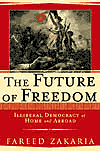|
|
| |
BOOK
REVIEW
Democracy
and mobocracy
The Future of Freedom by
Fareed Zakaria
Reviewed by Sreeram Chaulia
 A
panoply of political philosophers, from
Aristotle, Montesquieu, De Tocqueville and
Edmund Burke to Francis Fukuyama, have worried
about the excesses of democracy that can
degenerate into mobocracy. Newsweek
International editor and former editor of the
influential Foreign Affairs journal, Fareed
Zakaria joins this brotherhood with an
ambitious conservative critique of illiberal
democracy. A rising star in the American
foreign policy horizon, Zakaria has been
tapped as a future secretary of state, the
first Muslim to occupy the office. His columns
and books enjoy enormous reach and impact in
the United States and around the world. This
new work cements his place as an original
thinker on global systems, however much one
may resent the elitism that runs amok from
cover to cover. A
panoply of political philosophers, from
Aristotle, Montesquieu, De Tocqueville and
Edmund Burke to Francis Fukuyama, have worried
about the excesses of democracy that can
degenerate into mobocracy. Newsweek
International editor and former editor of the
influential Foreign Affairs journal, Fareed
Zakaria joins this brotherhood with an
ambitious conservative critique of illiberal
democracy. A rising star in the American
foreign policy horizon, Zakaria has been
tapped as a future secretary of state, the
first Muslim to occupy the office. His columns
and books enjoy enormous reach and impact in
the United States and around the world. This
new work cements his place as an original
thinker on global systems, however much one
may resent the elitism that runs amok from
cover to cover.
We are living in a democratic age where 119
countries are governed through universal adult
franchise. Pressures from the masses are the
primary engines of social change. Capitalism
itself has been democratized, as consumption,
saving and investing are now mass phenomena.
Culture has been democratized thanks to
popular music, blockbuster films and
prime-time television. Technology and
information have been democratized. Zakaria
asks if this shift of power has not
overreached itself to the detriment of
liberty. "Democracy is flourishing,
liberty is not." (p 17)
Liberty is secured through
"constitutional liberalism", ie rule
of law, separation of powers, protection of
private property, freedom of speech, assembly
and religion. In Yugoslavia, Indonesia, Iran,
Peru, Palestine, Zimbabwe etc, democratization
is antagonistic to constitutional liberalism
and is imposing new forms of tyranny. In the
US, too, slavery and segregation were
entrenched in the South by the democratic
system. The American Congress is today
"utterly open to its constituents' views
and pressures more responsive, more democratic
and more dysfunctional". (p 23)
Political parties and professionals are
engaged in a spiraling search for the
"pulse of the people", a race to
"be the first to genuflect before the
people". Zakaria alleges that Western
democracy's pandering to populism, special
interests and lobbies has taken the inner
stuffing out of liberty. Just as Ulysses, the
Greek mythological hero, imposed limits on
himself and took the advice of Circe while
crossing the Island of Sirens,
"democratic societies need new buffers
and guides", unelected institutions that
can temper and tame public passions, educate
citizens and preserve liberty.
The first fires of liberty were lit by strife
between church and state in Europe from the
time of Constantine. Catholicism's
independence from the state and countervailing
authority limited government. European landed
aristocracy's near equal relationship with
kings in the Middle Ages gradually allowed for
separation of powers. Dukes, barons and counts
forced monarchs to concede freedoms, thereby
limiting the arbitrariness of the state. The
Reformation rejected the now-oppressive
authority of the papacy from the 16th century
and opened space for religious liberty.
Capitalism created an independent class of
businesspeople who pushed the envelope for
free trade, free markets and individual
rights. Zakaria maintains, "capitalist
growth is the single best way to create an
effective and limited state". (p 76)
If capitalism and constitutionalism come
first, followed by democracy, the sequence is
liberty-enhancing. South Korea, Taiwan,
Thailand and Malaysia liberalized their
economies, legal systems and rights of worship
and travel before transiting toward democracy.
"Premature democratization" must be
avoided. Taking more leafs out of history,
Germany, Austria-Hungary and France had
bourgeoisie and civil societies that were
weak, divided and subservient to the state.
Their democratization had to undergo violent
shocks. Oil-rich Persian Gulf sheikdoms,
Nigeria and Venezuela have business classes
deeply dependent on the state. They are
immature for full-scale democracy. Endowed
with independent economic institutions,
countries like Belarus, Bulgaria, Malaysia,
Turkey, Morocco and Tunisia are ideally placed
for liberal democracy to flourish. Singapore,
the apotheosis of economic freedom, "will
be a fully functioning liberal democracy
within a generation". (p 86) China's
administrative and legal reforms and its
truncation of state power in the economy are
also conducive to Zakaria's preferred form of
democracy.
Having missed liberty-friendly sequencing,
many countries are afflicted by "elected
autocrats" and illiberal democracy.
Zakaria claims that half of the democratizing
nations in the world are illiberal
democracies. Boris Yeltsin emasculated
competing centers of power in Russia -
legislatures, courts and regional governors.
Vladimir Putin has taken the cue and left
absolutely none to check the Kremlin. African
states "overemphasized multi-party
elections and correspondingly neglected basic
tenets of liberal governance". (p 98)
Pakistan had a system in the 90s best
described as "fascist democracy",
which a "liberal autocrat" like
Pervez Musharraf is trying to change. India's
"semi-liberal democracy" has in
recent decades grown less tolerant, less
secular, less law-abiding, less liberal. Its
court system is a corrupt handmaiden of
politicians, who are also polarizing the
population on the basis of factional
solidarity in opposition to some other group.
Introduction of unregulated democracy in
Bosnia, Azerbaijan and Georgia has ended in
war. Echoing Immanuel Kant, Zakaria opines,
"without constitutional liberalism,
democracy itself has no peace-inducing
qualities". (p 116)
Elections in the Arab world would produce
demagogues closer in mentality to Osama bin
Laden than King Abdullah of Jordan. It would
be "one man, one vote, one time" and
an endless night of theocracy thereafter. Arab
politics is not culturally unique but has been
caught in a time warp since European inspired
liberal thought flourished in the Middle East
two centuries ago. Fundamentalism is on the
upswing owing to the total failure of Arab
political institutions. Zakaria calls the
mineral-laden kingdoms "trust-fund
states" that have too much unearned
income, don't need to tax the population and
provide accountability, transparency and
liberty in return. What the US should pursue
prior to free and fair elections in west Asia
is capitalism, a genuine middle class, rule of
law, civic institutions, courts and political
parties.
Moving to the US domestic arena, Zakaria
thinks too much democracy is shortening
liberties. Pursuit of public opinion has gone
out of control in Washington, so much that the
hyper-responsive poll-driven American system
has booted out institutions that guarded
liberalism. Congress is dictated by each
individual member's whim, which in turn is the
mouthpiece of a fanatically self-interested
lobby. Political parties are so open and
decentralized that nobody controls them.
Presidential primaries have been snatched from
party organizations and handed over to the
voters. Democratization of campaign finance
has converted fundraisers into king makers.
Politicos are single-mindedly focussed on
winning the next election to the exclusion of
all else. States like California have gone
overboard with direct democratic procedures
like referendums and initiatives, rendering
centuries of liberal governance chaotic.
"Politics did not work when kings ruled
by fiat and it does not work when the people
do the same". (p 196)
Zakaria's agenda is to resurrect institutions
and elites injured by mobocracy. American
democracy's halcyon era was served eminently
by public-spirited elites who acted as
"social stabilizers". From
independence until 1960, the WASP elites
(White, Anglo-Saxon Protestants) performed
public service as a responsibility that came
with power. They adhered to an unwritten code
of honor and took charge of local and
national-level public policy, showing the
masses the way. "Without guidance or
reference to authority, people can make bad
choices." (p 220) Zakaria argues for
delegation of governance to citizens
experienced in public affairs, nonpartisan
specialists who are unfazed by short-term
interests. Key decision-makers must be
insulated from the intense jockeying of
politics so that deliberative and unemotional
policies are implemented. Central banks, the
European Union and the World Trade
Organization work well due to their insularity
from vote-bank considerations. Those with
immense power should lead and set legal and
moral standards or else illiberal democracy
will take the world into a race to the bottom.
Zakaria's sophisticated and complex theory
deserves the attention of everyone worried
about democracy's inadequacies. However, his
unabashed admiration for elites and
"liberal autocrats" is worrisome.
The notion that a handful of aristocratic
know-alls can decide better on behalf of the
unlettered and underfed poor shocks
sensibilities and goes against the notion of
self-determination and decentralization. For a
scholastic work of this order, there is no
mention or concern for equality. Inequality of
status, wealth and power is a far greater
world problem than lack of
"liberties", as Zakaria defines
them. Readers would do well to consult Amartya
Sen's Development as Freedom to counter
Zakaria's fusillade against mobocracy.
The Future of Freedom. Illiberal Democracy
at Home and Abroad, by Fareed Zakaria.
Penguin Books India, New Delhi, June 2003.
ISBN: 0-67-004993-X. Price: US$24.95, 286
pages.
(Copyright 2003 Asia Times Online Co, Ltd. All
rights reserved. Please contact [email protected]
for information on our sales and syndication
policies.) |
| |
|
|
 |
|
| |
|
|
|
| |
|
|
|
|




 A
panoply of political philosophers, from
Aristotle, Montesquieu, De Tocqueville and
Edmund Burke to Francis Fukuyama, have worried
about the excesses of democracy that can
degenerate into mobocracy. Newsweek
International editor and former editor of the
influential Foreign Affairs journal, Fareed
Zakaria joins this brotherhood with an
ambitious conservative critique of illiberal
democracy. A rising star in the American
foreign policy horizon, Zakaria has been
tapped as a future secretary of state, the
first Muslim to occupy the office. His columns
and books enjoy enormous reach and impact in
the United States and around the world. This
new work cements his place as an original
thinker on global systems, however much one
may resent the elitism that runs amok from
cover to cover.
A
panoply of political philosophers, from
Aristotle, Montesquieu, De Tocqueville and
Edmund Burke to Francis Fukuyama, have worried
about the excesses of democracy that can
degenerate into mobocracy. Newsweek
International editor and former editor of the
influential Foreign Affairs journal, Fareed
Zakaria joins this brotherhood with an
ambitious conservative critique of illiberal
democracy. A rising star in the American
foreign policy horizon, Zakaria has been
tapped as a future secretary of state, the
first Muslim to occupy the office. His columns
and books enjoy enormous reach and impact in
the United States and around the world. This
new work cements his place as an original
thinker on global systems, however much one
may resent the elitism that runs amok from
cover to cover.








